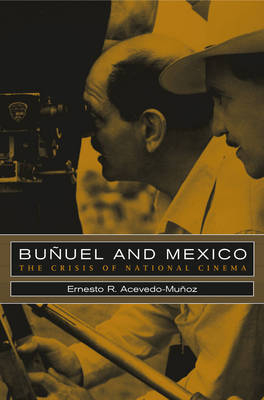
Bunuel and Mexico
The Crisis of National Cinema
Seiten
2003
University of California Press (Verlag)
978-0-520-23952-4 (ISBN)
University of California Press (Verlag)
978-0-520-23952-4 (ISBN)
- Lieferbar (Termin unbekannt)
- Versandkostenfrei innerhalb Deutschlands
- Auch auf Rechnung
- Verfügbarkeit in der Filiale vor Ort prüfen
- Artikel merken
An English-language study of Luis Bunuel's Mexican films, this book explores a significant area of this film-maker's distinguished career and aims to fill a gap in our appreciation and understanding of both Bunuel's achievement and the history of Mexican film.
Though Luis Bunuel, one of the most important filmmakers of the twentieth century, spent his most productive years as a director in Mexico, film histories and criticism invariably pay little attention to his work during this period. The only book-length English-language study of Bunuel's Mexican films, this book is the first to explore a significant but neglected area of this filmmaker's distinguished career and thus to fill a gap in our appreciation and understanding of both Bunuel's achievement and the history of Mexican film. Ernesto Acevedo-Munoz considers Bunuel's Mexican films--made between 1947 and 1965--within the context of a national and nationalist film industry, comparing the filmmaker's employment of styles, genres, character types, themes, and techniques to those most characteristic of Mexican cinema. In this study Bunuel's films emerge as a link between the Classical Mexican cinema of the 1930s through the 1950s and the "new" Cinema of the 1960s, flourishing in a time of crisis for the national film industry and introducing some of the stylistic and conceptual changes that would revitalize Mexican cinema.
Though Luis Bunuel, one of the most important filmmakers of the twentieth century, spent his most productive years as a director in Mexico, film histories and criticism invariably pay little attention to his work during this period. The only book-length English-language study of Bunuel's Mexican films, this book is the first to explore a significant but neglected area of this filmmaker's distinguished career and thus to fill a gap in our appreciation and understanding of both Bunuel's achievement and the history of Mexican film. Ernesto Acevedo-Munoz considers Bunuel's Mexican films--made between 1947 and 1965--within the context of a national and nationalist film industry, comparing the filmmaker's employment of styles, genres, character types, themes, and techniques to those most characteristic of Mexican cinema. In this study Bunuel's films emerge as a link between the Classical Mexican cinema of the 1930s through the 1950s and the "new" Cinema of the 1960s, flourishing in a time of crisis for the national film industry and introducing some of the stylistic and conceptual changes that would revitalize Mexican cinema.
Ernesto R. Acevedo-Munoz is Assistant Professor of Film Studies at the University of Colorado, Boulder.
List of Figures Acknowledgments Introduction 1. Mexican Cinema in the Time of Luis Bunuel 2. Bunuel and Mexico 3. Los Olvidados and the Crisis of Mexican Cinema 4. Genre, Women, Narrative 5. On the Road: Subida al Cielo and La Ilusion Viaja en Tranvia 6. Masculinity and Class Conflict: Bunuel's Macho-Dramas Conclusion. From Bunuel to "Nuevo Cine" Filmography of Luis Bunuel Notes Bibliography Index
| Erscheint lt. Verlag | 13.11.2003 |
|---|---|
| Zusatzinfo | 18 b-w photographs |
| Verlagsort | Berkerley |
| Sprache | englisch |
| Maße | 152 x 229 mm |
| Gewicht | 499 g |
| Themenwelt | Kunst / Musik / Theater ► Film / TV |
| Kunst / Musik / Theater ► Theater / Ballett | |
| Sachbuch/Ratgeber ► Sport ► Tanzen / Tanzsport | |
| ISBN-10 | 0-520-23952-0 / 0520239520 |
| ISBN-13 | 978-0-520-23952-4 / 9780520239524 |
| Zustand | Neuware |
| Informationen gemäß Produktsicherheitsverordnung (GPSR) | |
| Haben Sie eine Frage zum Produkt? |
Mehr entdecken
aus dem Bereich
aus dem Bereich


